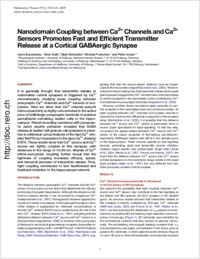Nanodomain coupling between Ca2+ channels and Ca2+ sensors promotes fast and efficient transmitter release at a cortical GABAergic synapse
- Bucurenciu, Iancu Physiological Institute I, University of Freiburg, Germany
- Kulik, Akos Institute of Anatomy and Cell Biology, University of Freiburg, Germany
- Schwaller, Beat Unit of Anatomy, Department of Medicine, University of Fribourg, Switzerland
- Frotscher, Michael Institute of Anatomy and Cell Biology, University of Freiburg, Germany
- Jonas, Peter Physiological Institute I, University of Freiburg, Germany
-
27.02.2008
Published in:
- Neuron. - 2008, vol. 57, no. 4, p. 536-545
English
It is generally thought that transmitter release at mammalian central synapses is triggered by Ca²⁺ microdomains, implying loose coupling between presynaptic Ca²⁺ channels and Ca²⁺ sensors of exocytosis. Here we show that Ca²⁺ channel subunit immunoreactivity is highly concentrated in the active zone of GABAergic presynaptic terminals of putative parvalbumin-containing basket cells in the hippocampus. Paired recording combined with presynaptic patch pipette perfusion revealed that GABA release at basket cell-granule cell synapses is sensitive to millimolar concentrations of the fast Ca²⁺ chelator BAPTA but insensitive to the slow Ca²⁺ chelator EGTA. These results show that Ca²⁺ source and Ca²⁺ sensor are tightly coupled at this synapse, with distances in the range of 10–20 nm. Models of Ca²⁺ inflow-exocytosis coupling further reveal that the tightness of coupling increases efficacy, speed, and temporal precision of transmitter release. Thus, tight coupling contributes to fast feedforward and feedback inhibition in the hippocampal network.
- Faculty
- Faculté des sciences et de médecine
- Department
- Département de Médecine
- Language
-
- English
- Classification
- Biological sciences
- License
- License undefined
- Identifiers
-
- RERO DOC 9228
- DOI 10.1016/j.neuron.2007.12.026
- Persistent URL
- https://folia.unifr.ch/unifr/documents/300666
Statistics
Document views: 89
File downloads:
- schwaller_ncb.pdf: 257
